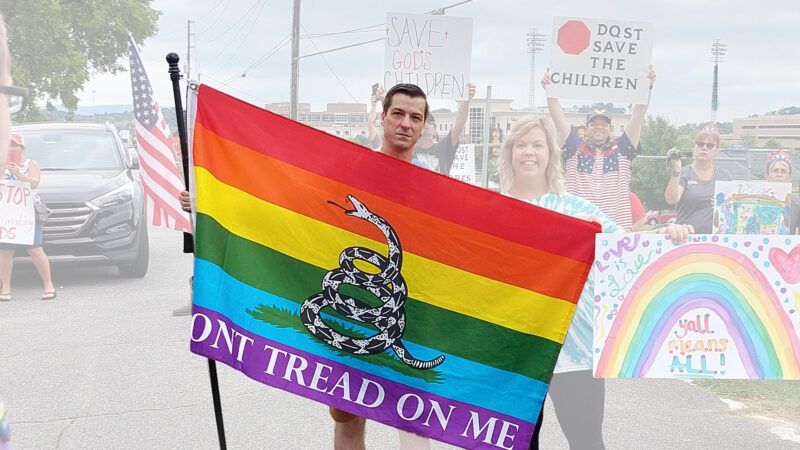What's Next for Chase Oliver, the Libertarian Who Forced a Runoff in the Georgia Senate Race?
He wants election reforms in Georgia, different priorities for the national Libertarian Party, and plans to challenge Justin Amash—but maybe not how you'd expect.

Chase Oliver is having a moment.
Last week, he scored more than 2 percent of the vote in Georgia's closely watched Senate race—enough to force a runoff between Sen. Raphael Warnock (D–Ga.) and Trump-backed Republican challenger Herschel Walker because neither candidate received more than 50 percent. That threw Oliver briefly into the national spotlight and made him a target for partisans on both sides who leveled accusations of spoiling the race for their preferred candidate. He got an interview on CNN, a segment on Fox Business' Kennedy, a neat profile from Vice, and an interview with Rolling Stone. Not bad for a guy who didn't win.
"This is kind of cool. I wanted to make sure that I made a statement and I think with that result, I did," Oliver told me when I caught up with him on Monday night at a divey sports bar tucked away behind a fried chicken joint on the northeastern edge of Atlanta. But even as he's reveling in his spoiler status for the Georgia Senate race, Oliver is already looking ahead to what comes next—for his state, and for the Libertarian Party (L.P.) at large.
"If you look at the amount of positive press that I've gotten out of this race, I think that tells you that you need to have Libertarians running top of the ticket," Oliver says.
Whether it is worth it for the L.P. to run candidates like Oliver in high-profile races where they are unlikely to win—but could play spoiler and hopefully influence other campaigns to compete for libertarian voters—is a major point of contention within the party. At the most recent L.P. convention in May, the party's leadership positions were seized by a faction that believes the L.P. should be focused more on winning local races. "We have a very specific focus. We focus on city council, sheriff, mayor, judge, school board," Michael Heise, the founder of the Mises Caucus, told Reason at the L.P. convention in May.
Oliver, who has been openly gay since high school and describes himself as a grown-up punk-rock kid, is not shy about criticizing the L.P.'s rightward lurch under the Mises Caucus' control—just check his Twitter account—and he worries that the party will kneecap itself by focusing too exclusively on local politics and the hyper-online libertarian audience.
"We should have libertarians running [in] local races, too, but it's really hard to create that brand awareness if you don't have somebody willing to run top of the ticket, win, lose, or draw," he says.
It's not as easy as he makes it sound. Oliver ran his campaign from his suburban Atlanta home while working two jobs and spending only a few thousand dollars—about 10 cents per vote received. Warnock and Walker combined to spend more than $100 million.
Of course, Oliver owes some credit for his recent showing to things beyond his, or the L.P.'s, control. Candidate selection seems to have dogged Republicans in nearly every big race this year, but arguably had the largest impact in Georgia.
There's also the matter of the state's unusual rules requiring a runoff if neither candidate gets to 50 percent of the vote. That might free some voters to follow their conscience in the first round of voting—perhaps by backing Oliver—with the knowledge that they will have a chance to vote strategically in the runoff. In a state with a more typical first-past-the-post system, Oliver may have seen some of his prospective voters reluctantly pulled to Warnock's or Walker's camp in the campaign's final days—a frustrating phenomenon with which any third-party or independent candidate has to contend.
Coming out of an election where so many Georgians rejected the two-party system, Oliver says there might be momentum for additional changes.
"Runoffs are better than plurality voting. Ranked-choice voting is better than runoffs," he says. "That's something that I'm going to be working on."
Oliver has also invited Warnock and Walker to attend a forum that he would host, allowing both runoff candidates to speak directly to issues that matter to libertarians and others who voted for Oliver in the general election.
"If you think you're the best choice for U.S. Senate, you should be able to have a long-form conversation about it," he says.
But now that Warnock and Walker have canceled their plans for a more standard debate in the weeks before the December 6 runoff, it's probably safe to say neither candidate is willing to have that conversation. That's a shame for Georgians caught in the middle of this awful choice.
Even if the forum doesn't come to fruition, Oliver's already got his sights set on what might be a more contentious contest—no, he's not willing to directly engage with my questions about whether he'll seek the Libertarian Party nomination for president in 2024.
"I am willing to go on the record right now that I will debate Justin Amash and Stacey Abrams on why [Deep Space Nine] is the best Star Trek series," he tells me as we head for the parking lot, breaking into a big smile now that we're talking about something even nerdier than third-party politics. "Everything's better with Garak."

Show Comments (87)